EMBRACE
Engineering, Medicine, Natural Sciences and Physical Sciences Bridging Research in Antimicrobial resistance: Collaboration and Exchange
EMBRACE was a two-year, EPSRC project which started in August 2015. It's aim was to bridge the gap between Engineering, Medicine and the Natural and Physical Sciences in antimicrobial resistance (AMR) research.
EMBRACE is sponsored by the EPSRC, as part of its 'Bridging the Gaps' initiative. The purpose of EMBRACE is to nurture multidisciplinary research within Imperial College to challenge the catastrophic threat of antimicrobial resistance. The programme is principally designed to develop a cohort of interdisciplinary research fellows who will develop a unique set of hybrid research skills, a positive attitude to multidisciplinary research and the ability to communicate across traditional academic boundaries.
Supporting this main aim are a range of activities including developing the ARC virtual network, organising conferences and seminars, a sandpit exercise and providing pump-priming support to AMR projects.
PIs and Fellows
Principal and co-investigators
- Professor Chris Toumazou, Regius Professor of Engineering, Chair in Biomedical Circuit Design, Dept. of Electrical and Electronic Engineering
- Professor Alison Holmes, Professor of Infectious Diseases, Department of Medicine
- Professor Alan Armstrong, Head of Department of Chemistry
- Dr Pantelis Georgiou, Reader, Department of Electrical and Electronic Engineering
EMBRACE Fellows
- Dr Pau Herrero-Viñas, Department of Electrical and Electronic Engineering
- Dr Dominic Affron, Department of Chemistry
Principal and co-investigators
Professor Christofer Toumazou
/dev01/channel_2/media/migration/research-groups/Chris-Toumzaou--tojpeg_1448579350580_x2--tojpeg_1493717850251_x4.jpg)
Professor Christofer Toumazou
Winston Wong Chair of Biomedical Circuits
Professor Alison Holmes
/dev01/channel_2/media/migration/research-groups/Alison--tojpeg_1493718500200_x4.jpg)
Professor Alison Holmes
Professor of Infectious Diseases
Professor Alan Armstrong
/dev01/channel_2/media/migration/research-groups/Alan--tojpeg_1494233040216_x4.jpg)
Professor Alan Armstrong
Head of Department of Chemistry
About us
- Imperial Network of Excellence
- Our pump priming projects
- Meet the Fellows
- Main events
- Seminar series
- News and articles
EMBRACE partnership with ARC@Imperial addresses key challenges in antimicrobial research by adopting a ‘one health’ approach. The ARC@Imperial collaborative has a truly multidisciplinary approach to antimicrobial research and we consider this the only way to tackle the growing threat of antimicrobial resistance (AMR), expanding interdisciplinary collaborations and communications in all aspects of health care for people, animals and the environment.
If you are a researcher or have a special interest in AMR research and would like to join the Imperial Network of Excellence in Antimicrobial Resistance, please contact our network manager Sara Yadav
The purpose of EMBRACE is to provide a focal point for facilitating cross-disciplinary research in AMR at Imperial College. With this in mind, five pump-priming projects and one sandpit award have been presented. All the pump-priming teams have the participation of at least one EMBRACE Fellow, and are truly multidisciplinary, not just cross department but cross faculty and some involve researchers who have not previously applied their work to the field of AMR. The aim is to support successful proof of concept studies that foster multidisciplinary consortium formation with mid to long-term collaboration, generating pilot data that will lead to successful application for larger grants.
Title: Rapid Evaporative Ionisation Mass Spectrometry for Early detection of Antimicrobial Resistance
Principal investigator: Professor Zoltan Takats, Surgery and Cancer
Co-investigators: Dr Frankie Bolt, Dr Simon Cameron Surgery and Cancer; Dr Gerald Larrouy-Maumus Life Sciences; Dr Pau Herrero-Viñas (EMBRACE Fellow) Electrical and Electronic Engineering;
This project aims to utilise a novel, real-time mass spectrometry technology (Rapid Evaporative Ionisation Mass Spectrometry (REIMS)) in two ways: firstly, to identify drug resistant isolates from bacterial colonies, and secondly, to directly analyse clinical samples for biomarkers of infection using a point of care device. Both these approaches will have a significant impact on clinical care and will also prevent empirical and, in many cases, unnecessary antibiotic prescriptions which are major drivers of antibiotic resistance.
Title: Targeting quadruplex-DNA in the promoters of genes associated to antibacterial resistance
Principal investigator: Professor Ramon Vilar, Chemistry
Co-investigators: Prof Alain Filloux Life Sciences; Dr K. Miraz Rahman Institute of Pharmaceutical Science – King’s College; Dr Lindsay Evans (former EMBRACE Fellow) Natural Sciences
The overall aim of this proof-of-concept project is to establish the regulatory roles that quadruplexes formed in the promoter regions of murE and ftsB have in the expression of these genes in P. aeruginosa. The ultimate aim is to establish new targets in the future development of antibacterial agents. This project brings together three internationally-leading research groups and two EMBRANCE fellows with highly complementary expertise.
Title: Antimicrobial resistance in gut communities
Principal investigator: Dr Caroline Colijn, Mathematics
Co-investigators: Dr Lesley Hoyles Surgery & Cancer; Dr Nicholas Croucher Infectious Disease Epidemiology
In this project we will directly observe how antibiotics drive interactions between AMR and AMS genes and how they affect metabolic function in human gut microbial communities. The team has the combined expertise to use metagenomic tools to characterise AMR and AMS genes and plasmids to characterise metabolic functions with NMR metabolomics, to develop state of the art mathematical characterisations and comparisons of these complex datasets and to make resulting tools available to the community.
Title: LIPID-MINDS: Lipid Mapping to Identify Novel Drug Solutions
Principal investigator: Dr Gerald Larrouy-Maumus, Life Sciences
Co-investigators: Prof Mark Chambers School of Veterinary Medicine, Health & Medical Sciences; Prof Zoltan Takats, Dr Frankie Bolt, Dr Renata Soares Surgery and Cancer; Dr Lindsay Evans (former EMBRACE Fellow), Dr Rudiger Woscholski, Prof Ramon Vilar Department of Chemistry
This novel and interdisciplinary project arose from the interactions between the participants at the first EMBRACE Sandpit (July 2016). The originality of this proposal is to identify and design specific chemicals that will interfere with host-pathogen lipid metabolism during tuberculosis (TB) infection. This strategy is equally applicable to other intracellular bacterial pathogens, such as Shigella, Salmonella to cite a few.
Title: Real-time Enhanced Antimicrobial ConTroller (REACT)
Principal investigator: Dr Timothy M Rawson, NIHR HPRU HCAI & AMR
Co-investigators: Dr Pau Herrero (EMBRACE Fellow) & Dr Maryam Modarai (former EMBRACE Fellow), Electrical Engineering & Medicine; Dr Danny O’Hare Bioengineering; Mark Gilchrist Imperial College Healthcare NHS Trust; Prof Martin Wilkins Imperial Clinical Research Facility; Dr Pantelis Georgiou Electrical and Electronic Engineering; Prof Tony Cass Chemistry; Prof Alison Holmes Medicine
This project investigates a novel method of precision antimicrobial delivery utilising a closed-loop control system integrating a novel continuous minimally invasive antimicrobial sensor. This allows real-time assessment of antimicrobial levels to guide a closed-loop controller (e.g. PID, MPC or iterative learning control), which optimises the delivery of antimicrobial agents through direct communication and adjustment of an infusion pump.
Title: Promoting Immune Clearance of Bacterial Pathogens (EMBRACE Sandpit award)
Principal investigator: Dr Andrew Edwards, Bacteriology
Co-investigators: Dr John Tregoning Bacteriology; Dr Ali Saleh-Reyhani Single cell analysis; Dr Avinash Shenoy Immunology; Dr Myrsini Kaforou Bioinformatics; Dr Lindsay Evans (former EMBRACE Fellow) and Dr Thomas Lanyon-Hogg Chemistry; Dr Mike Cox Microbiome
This project takes a novel approach by increasing the susceptibility of bacteria to immune killing. The aim of this proposal is to develop small molecule inhibitors of a specific DNA-repair complex that can be used prophylactically or therapeutically to promote immune clearance of bacterial pathogens and reduce the emergence of drug-resistance. If successful, this will provide proof-of-concept for new approaches to treating and preventing infection and provide the foundations for a new class of anti-infective drugs. Additional impact arises from the training of a young group of researchers in multi-disciplinary, collaborative approach to the development of the next generation of independent AMR researchers.
The EMBRACE Fellows
Pau received a MEng degree in industrial engineering from the University of Girona (Spain) in 2001, and a PhD in control engineering from University of Angers (France) in 2006. He then spent one year as a Research Fellow at University of California Santa Barbara (USA) working on diabetes technology related projects, followed by two years at Sant Pau Hospital/Autonomous University of Barcelona (Spain) leading different eHealth projects for the prevention and management of diabetes.
He is currently a Research Fellow (EMBRACE) within the Centre for Bio-inspired Technology at Imperial College London. His main focus of research in AMR is on developing point-of-care decision support systems to optimize antimicrobial prescribing in intensive and secondary care settings.
Dr Dominic Affron
Dominic obtained a MChem degree from St. John’s College, University of Oxford, having worked with Prof. Timothy Donohoe for his Part II project. He then completed a PhD degree under the supervision of Dr. James Bull at Imperial College London, and subsequently worked in the same group as a Postdoctoral Research Associate for 6 months, developing new strategies for the synthesis of saturated heterocycles. He currently holds a senior postdoc position in Synthesis/Chemical Biology with Prof. Alan Armstrong at Imperial College London.
Dominic is currently a Research Fellow (EMBRACE) within Organic Synthesis/Chemical Biology at Imperial College London.
Former EMBRACE Fellow Dr Lindsay Evans
Lindsay studied for a MChem degree in Chemistry with Medicinal Chemistry at the University of Leeds, before completing her PhD at the Institute of Cancer Research (ICR) under the supervision of Prof. Keith Jones. Following completion of her PhD, she spent a year working as a Postdoctoral Training Fellow at the ICR in the field of small molecule drug discovery and was a Research Fellow (EMBRACE) within the faculty of Natural Sciences at Imperial College London until March 2017.
She currently holds a Wellcome Trust: Pathfinder Award in collaboration with Dr. Andy Edwards (CMBI) and Prof. Alan Armstrong (Chemistry).
Supporting our programme are a range of activities to break-down barriers and encourage engagement between departments, in particular, two main conferences centred around AMR research and a workshop to encourage engagement between students and our cohort of experienced multidisciplinary researchers working in the field of AMR.
The first EMBRACE conference was held in March 2016 and brought together a field of high profile and innovative researchers across Medicine, Engineering and the Natural and Physical Sciences. We had flash presentations, panel discussions and a poster competition.
Find more about our first conference here
The Technology vs Infectious Diseases: An Imperial College / Royal Institution Summit held in September 2017 showcased current research in science and technology that can have a major role in the fight against global infectious diseases and drug resistant infections.
Find more about our summit here
In our summer workshop "Tackling the Global Challenge of Antimicrobial Resistance" attendees had the opportunity to become familiarised with the challenges in AMR through a series of presentations by the EMBRACE pump priming and sandpit awardees, followed by a Dragons' Den competition.
EMBRACE organised regular seminars open to all Imperial College staff, students and affiliates. The seminars were intended for a multidisciplinary audience. Presentations lasted about 30 minutes, after which there was plenty of time for questions and discussions. .
| Where and when | Presentation |
|---|---|
| 15 November 2017, South Kensington
|
Special seminar on "Intelligent use of Data to tackle antimicrobial resistance" with guest speaker Dr Gwen Knight from LSHTM. Dr Tim Rawson presented on “Improving decision making during antimicrobial management”. Antimicrobial resistance is a leading patient safety issue. With the increasing uptake of electronic health records, research has started to focus on methods of optimising the use routinely available data to improve decision making surrounding antimicrobial management. Often packaged within clinical decision support systems, these tools tend to have a narrow focus and experience failures in adoption by end users following implementation. Several recommendations have been made to improve the development and reporting of such tools in the literature. In this seminar, the role of integrated decision support was reviewed including the need for linkage with behaviour change to promote better adoption on implementation by end users. Our guest speaker from LSHTM, Dr Gwen Knight, presented on “Tackling transmission of antimicrobial resistance using mathematical models”. Antimicrobial resistance (AMR) is one of the world’s biggest public health concerns. Although many interventions have been suggested, determining which will have the biggest impact is of great importance. One way to compare interventions and hence optimise resource allocation is to predict future AMR burden under different control measures using mathematical modelling. However, these predictions rely on a complex and often hidden parameter: the rate of transmission. In this talk Dr Knight discussed how we can use colonisation pressure as a proxy for transmission, estimate this parameter from clinical data and describe how the complicated natural history of transmission (or fitness) can be teased apart using mathematical models. This will use data on carbapenem resistant Enterobacteriaceae (CRE) from Imperial College Healthcare NHS Trust, as well as data from Peru on multi-drug resistant Mycobacterium tuberculosis transmission. Timothy Miles Rawson a Clinical Research Fellow at the NIHR Health Protection Research is currently leading EPIC IMPOC, a project aiming at exploring the utility of integrating machine learning techniques, rapid diagnostics, and mechanisms for drug dose optimisation into clinical decision support systems to improve infection management in the hospital setting. Gwen is an Assistant Professor at LSHTM. She currently holds an MRC Skills Development Fellowship. Her research focuses on using mathematical modelling to target infectious disease spread, in particular the spread of antimicrobial resistance. |
| 18 October 2017, South Kensington |
Professor Ramon Vilar, "Targeting quadruplex-DNA in promoters of genes associated to antibacterial resistance" Antimicrobial resistance (AMR) is increasingly being recognised as one of the biggest global health concerns. The inability to treat bacterial infections could lead to an annual death toll of 10 million worldwide by 2050 and make many of the medical advances of the 20th century obsolete. The 3-decade void in antibiotic drug discovery means that recently discovered therapeutic targets have not been fully exploited in this field. An example of a therapeutic target that has so far been under exploited in AMR are the G-quadruplexes, which have been extensively studied in cancer. G-quadruplexes are quadruply-stranded helical structures found in guanine-rich oligonucleotides and are thought to play essential biological roles including regulation of gene expression. In this seminar Prof Vilar described preliminary investigations aimed at exploring the role that G-quadruplexes may play in regulating the expression of genes responsible for antibiotic resistance in Pseudomonas aeruginosa. The latter is responsible for many life-threatening infections and has been identified as one of three highest priority pathogens in a recent World Health Organisation report. The talk focused on the biophysical characterisation of a series of quadruplex-forming sequences. Prof Vilar showed that some of them form robust G-qudruplexes and they may be potential targets for the development of new small-molecule drugs. |
| 14 March 2017, South Kensington |
Dr Avinash Shenoy, “Caspase targets in host immunity to infection” Caspases are cysteine proteases that regulate many aspects of cellular and immune physiology through the actions of their substrates. The contributions of caspases to host-defence will be better understood if we identify and characterise their substrates more comprehensively. Dr Avinash's group identified several new targets of caspases through proteomics, and they are currently characterising their roles during infection. Professor Jackie Hunter, “AI and Biomedicine: Culture clash or marriage made in heaven” Jakie Hunter has made major scientific contributions to neuroscience research and development within the pharmaceutical industry and has had a broader impact across industry and academia. She is also a Professor at St George’s Hospital Medical School and was CEO of the Biotechnology and Biological Sciences Research Council. You can watch Jakie here on "Using AI to gather data for pharmaceutical R&D" Richard Compton, “Nanopore Sequencing, with a focus on Infectious Diseases” Richard’s introduction to nanopore sequencing showed us how this technology is designed, allowing the user to digitise a biological sample and stream data for real time analysis with little or no laboratory infrastructure and share the results with other professionals, such as scientists, organisations, or healthcare professionals. |
| 7 January 2017, South Kensington |
Dr Tim Rawson, "Enhanced, Personalised, and Integrated Care for Infection Management at the Point-of-Care” EPIC IMPOC Healthcare professionals who diagnose and treat infections must often do so rapidly to prevent harm to their patients. Their prescribing decisions can be assisted by providing them with access to treatment recommendations, based on the most likely organism causing the infection (antimicrobial guidelines) and data on local antimicrobial resistance patterns. These decision support systems are mostly rule-based, providing easy-to-access policies or guidelines. |
| 18 November 2016, South Kensington |
Dr Caroline Colijn, “Bacterial Olympics: Competition and resistance” Bacteria compete all the time: for hosts to infect, for resources within those hosts, against each other in a hostile immune system whose cells can only target so many bacilli at a time. The outcome of these Olympian struggles for survival depends on "fitness", but fitness is complex. One type's success depends on who it's competing with and how much, as well as on the host environment and antimicrobial treatment. These competitions happen over days, but also over decades, both within hosts and at the community and national levels. Caroline;s group has found how resistance plays out over time depends crucially on how strongly resistant and sensitive variants compete -- for example, if they share a scare resource, they compete more than if the resource is plentiful. Competition can take place at different strengths and in diverse ways, and it can dramatically change how best to manage resistance. While competition is challenging to observe directly, it may be possible to use pathogen genetic data in novel ways to detect it. Professor Alasdair "Alex" Cook, Head of the Department of Veterinary Epidemiology and Public Health from University of Surrey A veterinary epidemiologist with more than 25 years of national and international experience Professor Alex Cook interest in epidemiology grew from working in farm animal veterinary practice and in preventive veterinary medicine in the UK and overseas. With a professional life engaged with and leading multi-disciplinary teams makes Alex a natural proponent of the One Health perspective and a promoter of digital innovation in animal health in research, education and business. |
| 18 October 2016, South Kensington |
Dr Jesus Rodriguez Manzano, "Towards rapid point-of-care diagnostics for infectious diseases and antimicrobial resistance." Antibiotics have saved millions of lives, decreasing mortality associated with minor infections, injuries and childbirth, as well as preventing disease outbreaks from escalating to pandemic levels. However, the increasingly liberal use and misuse of antibiotics has led to a global health crisis: the widespread development of antimicrobial resistance. In order to provide correct, life-saving treatment and to facilitate antibiotic stewardship it is critical to have a rapid and reliable test for pathogen’s susceptibility to the available drugs. Because most antibiotics are prescribed outside of tertiary hospital settings without an immediate access to a clinical lab—physician offices, emergency rooms, urgent care clinics—antibiotic therapy and stewardship critically depend on a distributed antibiotic susceptibility test that can be performed rapidly at the point of care. |
| 13 July 2016, South Kensington |
Dr Nick Voulvoulis, “Antibiotics in the environment, implications for Antibiotic-Resistance” The environmental pathways that result in an increased risk associated with antibiotic-resistant bacteria are multiple and complex. Antibiotics can enter the environment in many ways, from production, through the excretion of residues after usage (households and hospitals), through discarding unused medicines, or farming practices as a result of animal use. Dr Voulvoulis group has investigated two of these routes: via the effluent from wastewater treatment works (WWTWs) after excretion from the body, and by the disposal of out-of-date or unwanted medicines, which may occur via the sink/toilet or in household waste. Findings showed nearly 80% of people consuming all of the painkillers that they buy or are prescribed, whereas the figure for antibiotics (18%) was worryingly low. Household waste was the most popular disposal method for all types of drugs. Dr Voulvoulis group also looked at pharmaceutical waste as a problem for the National Health Service (NHS); and investigated the potential of medicine reuse schemes. This led to the development of a framework to enable authorities responsible for hospital management to evaluate risks associated with pharmaceuticals in wastewater effluents and solid waste. |
| 8 June 2016, Hammersmith |
Prof Ramesh Wigneshweraraj, "Phage-inspired solutions to combat antibacterial resistance?" |
| 19 April 2016, South Kensington |
Dr Nickolas Croucher, "The emergence, spread and loss of antibiotic resistance in pneumococci" Dr Elita Jauneikaite, "Using whole genome sequencing to investigate healthcare-associated infections and antimicrobial resistance" |
| 16 Feb 2016, South Kensington |
Dr Enrique Castro-Sanchez, "Do Android (phones) dream of health games and apps? Exploring e/g-health interventions in patient safety" |
| 26 Nov 2015, South Kensington |
Dr Gabriel Birgand, "Measures to control the spread of Multi-drug resistant organisms in hospitals: what are the current problematics?" |
| All seminars are at either South Kensington or Hammersmith campus. | |
Technology vs Infectious Diseases: An Imperial College / Royal Institution Summit
In today’s globalised world, the increased movement of people, the expansion of international trade in foodstuffs, not to mention growing antimicrobial resistance, mean that the dangers posed by infectious diseases have never been greater. Infectious diseases are now spreading geographically much faster than at any time in history and there are now nearly 40 diseases that were unknown a generation ago. In addition, during the last five years, the World Health Organisation has verified more than 1,100 epidemic events worldwide. However, some of the smartest minds in industry, academia and charities are consolidating their efforts into tackling this key global challenge.
On the 26th September at The Royal Institution in Mayfair, the Technology vs Infectious Diseases Summit revealed how the best in UK research and technology is helping to combat bacterial, viral, parasitic and fungal diseases. The Summit included British industry, academia, NGOs and young entrepreneurs, showcasing the worldwide contribution of UK research in this area and its collaborations with developing countries.
The afternoon started with a welcome from Professor Gail Cardew, Director of Science and Education at the Royal Institution and an introduction by Professor James Stirling, Imperial College Provost. The first session, chaired by Professor Alison Holmes, started with a focus on Global Infection threats, with presentations covering innovative technology for the management and control of dengue by Dr Jesus Rodrigues Manzano and Dr Sophie Yacoub, an inter-disciplinary approach for malaria eradication by Professor Jake Baum and how the global emergence of antimicrobial resistance in pathogenic fungi is being recognised as a major driver for infectious diseases mortality by Dr Darius Armstrong-James. Following these presentations, Professor Robin Shattock gave us an overview on “‘Vaccines vs infection’: old foes, emerging threats and changing populations” and closing the first session we were delighted to have a presentation by Dr Emmanuel Hanon, Global Head of GSK Vaccine Research and Development on the emerging complex needs regarding vaccines and most recent advances in vaccine technology platforms such as the vision for the SAM vaccine rapid response platform or a new class of vaccines, that rely on a different way to mimic infection and can offer faster, cheaper and unique multipurpose production like “RNA vaccines”.
The second session, chaired by Dr Pantelis Georgiou, focused on the challenges of bacterial infections and what technology can do to tackle this issue. To kick-start this session we were introduced to DNA sequencing-based tests that can rapidly provide accurate diagnostic information on infectious diseases by Professor Chris Toumazou, Regius Professor of Engineering at Imperial and also Ri Trustee and Founder and Executive Chairman of DNAe and Mr David Davidson, Chief Scientific Officer from DNA Electronics ltd. Following this, we had a presentation on machine learning and biosensor technology to improve the precision of antibiotic management by Dr Danny O’Hare and Dr Tim Rawson. This session then moved on to a talk about “Serious games: a new ‘tablet’ against drug-resistant infections” using a software that uses psychological techniques in games to optimise prescriber behaviours in hospitals, developed by Dr Enrique Castro Sánchez and Mr Jamie Firth. The session finished with a presentation on early detection of antimicrobial resistance using rapid evaporative ionisation MS (REIMS) in the diagnostic laboratory and livestock infection, by Dr Fankie Bolt and Dr Simon Cameron.
Following the afternoon presentations, the audience enjoyed a showcase of technologies that included ProMED, an Internet-based reporting system dedicated to rapid global dissemination of information on outbreaks of infectious diseases; POCAST and Target, facilitating navigation, access and use of national antimicrobial guidelines to support clinical prescribing decisions; and Microreact, open data visualisation and sharing for genomic epidemiology. Also among the technology on display at the Ri was DNA Electronics ltd LiDia BSI Test for diagnosis of bloodstream infections that lead to sepsis, which was unveiled for the first time and EPIC IMPOC an NIHR i4i funded project which aims to develop an intelligent clinical decision support system to help doctors prescribe the most appropriate antibiotics. We also welcome at the showcase of technologies the Centre for Genomic Pathogen Surveillance (CGPS), a joint initiative between Imperial College London and the Wellcome Genome Campus that aims to understand the emergence and spread of drug resistance pathogens and use whole genome sequencing for its global surveillance, providing at the same time actionable data. Also present was the BBC Pandemic team explaining how their APP could be key in preparing for the next pandemic outbreak. After presenting in the second session, Dr Enrique Castro Sánchez and Mr Jamie Firth also showcased their ‘tablet’ game against drug-resistant infections and Dr Darius Armstrong-James presented us with a small scale fungorium.
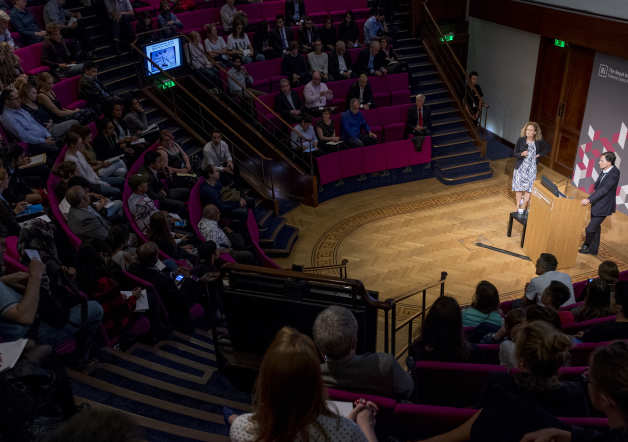
The evening was hosted by Sir Richard Sykes, Chair of the Royal Institution and former Rector of Imperial College, and featured a keynote address by Professor David Heymann Head of the Centre on Global Health Security at Chatham House, on “Global Infectious Diseases: Priorities for action”.
With the unprecedented growth of newly emerging diseases and the live threat of infectious diseases spreading rapidly at a global level, the critical debate through the public communication of science is even more paramount. This summit at the Ri, a place where cutting-edge science has been announced, debated and showcased to the world for over 200 years, is a reminder that the research in science and technology carried out in this country has a major role in the fight against global infectious diseases and drug resistant infections.
Download the day's programme here
Imperial College news and events coverage
"Tackling the Global Challenge of Antimicrobial Resistance" an EMBRACE Workshop and Dragons Den Competition
The EMBRACE Workshop focused on the challenges we are facing in antimicrobial resistance (AMR), and how multidisciplinary research spanning Engineering, Medicine, Physical and Natural Sciences can help solve this problem. Attendees became familiarised with some of the challenges in AMR through a series of presentations by the EMBRACE Pump Priming and Sandpit awardees. Following these presentations, we hosted a Dragons’ Den Competition where challengers pitched to a panel of experts how their research could tackle the challenge of AMR. The afternoon closed with a networking BBQ event where attendees had the opportunity to interact with our cohort of experienced multidisciplinary researchers working in the field of AMR.
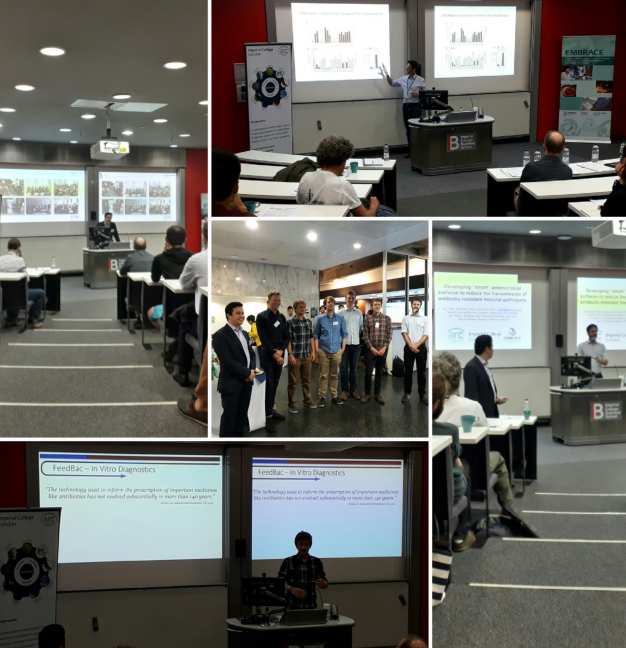 The first session of the afternoon focused on the EMBRACE Pump Priming and Sandpit awarded projects and their progress to date. The following Sandpit and Pump Priming awardees were present: Promoting Immune Clearance of Bacterial Pathogens, Dr Andrew Edwards; Rapid Evaporative Ionisation Mass Spectrometry for Early Detection of Antimicrobial Resistance, Dr Simon Cameron; Antimicrobial Resistance in Gut Communities, Dr Lesley Hoyles; LIPID-MINDS: Lipid Mapping to Identify Novel Drug Solutions, Dr Gerald Larrouy-Maumus; Real-time Enhanced Antimicrobial ConTroller (REACT), Dr Pau Herrero-Viñas.
The first session of the afternoon focused on the EMBRACE Pump Priming and Sandpit awarded projects and their progress to date. The following Sandpit and Pump Priming awardees were present: Promoting Immune Clearance of Bacterial Pathogens, Dr Andrew Edwards; Rapid Evaporative Ionisation Mass Spectrometry for Early Detection of Antimicrobial Resistance, Dr Simon Cameron; Antimicrobial Resistance in Gut Communities, Dr Lesley Hoyles; LIPID-MINDS: Lipid Mapping to Identify Novel Drug Solutions, Dr Gerald Larrouy-Maumus; Real-time Enhanced Antimicrobial ConTroller (REACT), Dr Pau Herrero-Viñas.
Our Dragons Den competition closed the afternoon session. We invited PhD students and early career post-doctoral researchers, either as individuals or groups, to give a 5 minute “Dragons’ Den” style pitch to a panel of experts as to how their research can contribute to addressing the challenge of AMR. Dr Pantelis Georgiou (Department of Engineering) chaired the competition, and our ‘Dragons’ were Professor Alison Holmes (Department of Medicine), Professor Alan Armstrong (Department of Chemistry), Professor Sivaramesh Wigneshweraraj (Department of Medicine), and Jon Wilkinson, our guest from Imperial Innovations. Seven groups were shortlisted to present at the ‘den’ to an audience of more than 60 researchers and students. Two prizes of £1000 were awarded to the winners to kick-start and support their projects, which will also receive mentorship from world experts in the field towards implementing their idea and furthering their career through potential applications for funding. The winners were Jon Otter with the project entitled "Developing “smart” antimicrobial surfaces to reduce the transmission of antibiotic-resistant hospital pathogens" and team FeedBacUK, which proposed a colour changing test for specific pathogenic bacteria that is fast, affordable and simple to use.
The aim of this workshop was to bring together researchers and students and share results of current AMR research from the EMBRACE Pump Priming and Sandpit awarded projects. The afternoon was highly successful in fulfilling its aims of engaging the next generation of scientists on how their research can be used tackle the challenge of AMR.
Learn more about the afternoon's programme here
EMBRACE @ SuperBug Zone, Imperial Festival 2017
EMBRACE joined the Antimicrobial Research Collaborative (ARC) in the superbug zone for the second year running, teaming up with students, post-docs and staff to highlight the problem of antimicrobial resistance.
Visitors were invited to play the role of the “Infection Investigator” in an interactive game designed to help them understand the fight against superbugs, and to represent how the three Faculties (Medicine, Engineering and Natural Sciences) involved in the EMBRACE program are combining to tackle problems associated with AMR.
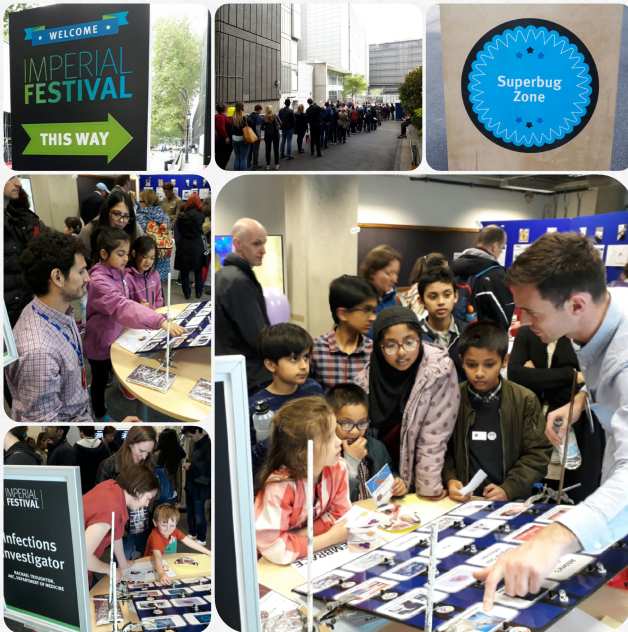 The game provided players visual real-time feedback on their decisions and increased awareness of the different types of infection. It took participants on a journey from spotting infection symptoms, to where to seek appropriate healthcare, to the name of the disease and the pathogen responsible from a list of three that are responsible for many common infections (viruses, bacteria and fungi) ending with the appropriate treatments. Information on the differences between these microorganisms was also provided. The game proved to be extremely popular, especially among children and young students since it was designed to be played as a team. The EMBRACE Fellows focused on discussing important points, such as recognising that flu is caused by a virus and as a result is not susceptible to antibiotic treatment.
The game provided players visual real-time feedback on their decisions and increased awareness of the different types of infection. It took participants on a journey from spotting infection symptoms, to where to seek appropriate healthcare, to the name of the disease and the pathogen responsible from a list of three that are responsible for many common infections (viruses, bacteria and fungi) ending with the appropriate treatments. Information on the differences between these microorganisms was also provided. The game proved to be extremely popular, especially among children and young students since it was designed to be played as a team. The EMBRACE Fellows focused on discussing important points, such as recognising that flu is caused by a virus and as a result is not susceptible to antibiotic treatment.
The Superbug Zone was one of the most popular venues on Imperial Festival 2017. Visitors said they enjoyed the simple and fun way the science was explained, enabling children and young students to understand and feel engaged with the exhibitions. This event gave our fellows a unique opportunity to engage with the general public, bringing visibility to the research being done in AMR at the Imperial College, and also providing children and young students with ‘role models’ in science.
EMBRACE special seminar
The 9th EPSRC EMBRACE seminar on the 14th March was a great success, with three exciting speakers and a full multidisciplinary audience including attendees from Chemistry, Engineering, and Medicine. The afternoon’s presenters included Dr Avinash R. Shenoy, Non-Clinical Lecturer in Molecular Microbiology, Professor Jackie Hunter, CEO of BenevolentBio and former CEO of the Biotechnology and Biological Sciences Research Council, and closing the afternoon was Richard Compton, General Manager at Metrichor.
The seminar commenced with a presentation by Dr. Avinash Shenoy on “Caspase targets in host immunity to infection” and how the identification of new proteins within the host could be exploited in our fight against bacterial infections. Avinash’s presentation focused on research currently being carried out at Imperial College within the field of AMR.
The afternoon followed on with a talk by Professor Jackie Hunter on “AI and Biomedicine: Culture clash or marriage made in heaven”. Professor Hunter introduced the problem of drug development costs and length, stressing that it can take over a decade and over two billion dollars to introduce a new medicine to the market. This can be a serious threat when fighting infectious diseases, in particular in the field of AMR. Thus, to have a sustainable and innovative industry capable of fighting this threat, it is imperative to reduce costs and improve success rates on developing new medicines. Jackie firmly believes that AI and machine learning technology have the potential to increase productivity of new pharma, changing the way we discover new drugs. Also highlighted was the importance of collaboration and knowledge sharing in order to rapidly progress this research field.
Our last speaker, Richard Compton, spiked the audience’s curiosity with an engaging introduction to “Nanopore Sequencing, with a focus on Infectious Diseases”. With so many recent technological advances in medical informatics, biomedical engineering and biomedicine, we have developed complex biomedical systems including innovative clinical and computer-based decision support systems. Richard’s introduction to nanopore sequencing showed us how this technology is designed, allowing the user to digitise a biological sample and stream data for real time analysis with little or no laboratory infrastructure and share the results with other professionals, such as scientists, organisations, or healthcare professionals.
The aim of this rich and multidisciplinary seminar was to bring together researchers and industry practitioners to share results of current AMR R&D. Some important questions were raised on the success rates of developing new medicines and how DNA sequencing and proteins can help us find solutions to deal with AMR in the rapidly evolving arena of “Tech vs infectious diseases”.
World Antibiotic Awareness Week
On 18th November 2016, EMBRACE organised its first joint seminar with SurreyCHAIR, associating the event with the World Antibiotic Awareness Week, raising awareness as well as funds with the Great British Tea Party.
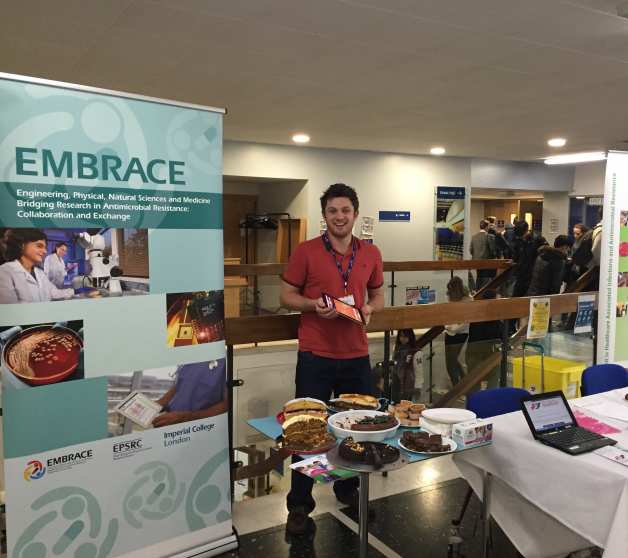 The guest reader was Professor Alasdair “Alex” Cook who is a veterinary epidemiologist with more than 25 years national and international experience in livestock animal health in Government, academic and development environments. Alex is a firm believer in a multi-disciplinary team approach to research, engaging with molecular biologists, microbiologists and socio-economists to name but a few. This idea brought both groups together and further collaboration is planned with a joint data visualisation workshop as well as a series of seminars/workshops on drug detection technology and devices; longitudinal study on education and AMR stewardship and economics and prescribing.
The guest reader was Professor Alasdair “Alex” Cook who is a veterinary epidemiologist with more than 25 years national and international experience in livestock animal health in Government, academic and development environments. Alex is a firm believer in a multi-disciplinary team approach to research, engaging with molecular biologists, microbiologists and socio-economists to name but a few. This idea brought both groups together and further collaboration is planned with a joint data visualisation workshop as well as a series of seminars/workshops on drug detection technology and devices; longitudinal study on education and AMR stewardship and economics and prescribing.
Our second reader of the day was Caroline Colijn on “Bacterial Olympics: Competition and resistance”. She works with a broad aim to develop the mathematical tools to connect sequence data for pathogens to pathogen ecology. Caroline also has a long-standing interest on the dynamics of diverse interacting pathogens. Her group is building new approaches to analysing phylogenetic trees derived from pathogen sequence data, studying tree space and branching processes, and doing ecological and epidemiological modelling.
After the presentations the attendees stayed for our charity bake sale and coffee morning, part of the Great British Tea Party organised to help Antibiotic Research UK to raise valuable funds for research, education and patient support. We managed to raise over £120 and sold delicious cakes made for the event by members from our team.
The morning was highly successful in fulfilling our aims of raising awareness and funds to the World Antibiotic Awareness Week and also engaging with researchers from Surrey School of Veterinary Medicine, following an earlier meeting in July.
Imperial’s ARC & EMBRACE collaborations joined forces with the School of Public Health to deliver a day with a focus on AMR in the context of global health
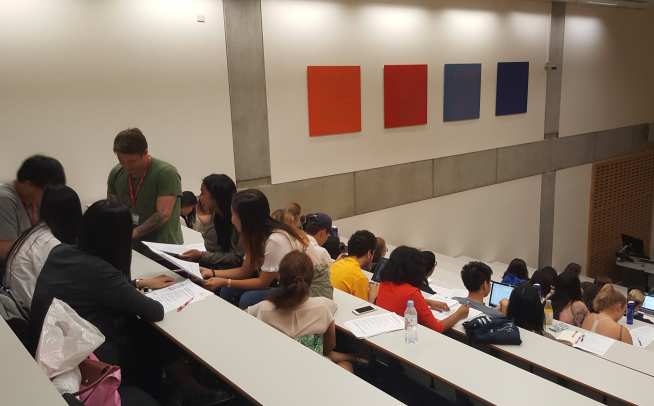
The 2016 Faculty of Medicine Summer School, Revolutions in Biomedicine, brought together bioscience and medical students from all over the world. Through lectures, interactive group work and laboratory research projects they covered topics as diverse and wide-ranging as stress to big data. On the penultimate day of the school, the EMBRACE team joined forces with Dr Mariam Sbaiti from the School of Public Health to deliver a day on Antimicrobial Resistance & Global Health.
The day commenced with an introduction to antimicrobial resistance (AMR). This charted the discovery and widespread implementation of antibiotics to treat bacterial infections (a true revolution in biomedicine!), the emergence of resistance infection and the mechanisms by which they arise, and the potential post-antibiotic era that we face today. This was followed by two research talks from Imperial’s Antimicrobial Resistance Collaborative (ARC) fellows, Dr Martina Valentini and Dr Myrsini Kaforou. Both talks focused on specific areas of research within the field of AMR that are currently being undertaken at Imperial College, introducing the students to current research topics and giving insight into the world of biomedical research.
Dr Martina Valentini outlined how biofilm formation promotes the emergence of bacterial resistance and how this is a significant problem in areas such as hospital-acquired infections and lung infections in Cystic Fibrosis patients. Martina also discussed how understanding the mechanisms involved in biofilm development better could lead to the development of novel approaches to combating bacterial biofilms. Dr Myrsini Kaforou talked about the need for quicker and more reliable methods of diagnosing Tuberculosis (TB) infections. Tuberculosis affects an estimated 1 in 3 of the world’s population and the incidence of drug-resistant TB is an increasing problem. Myrsini described her research into developing a new diagnostic technique using genetic biomarkers to develop a “signature” of TB infection with the aim of producing a method of diagnosis that is both more specific and sensitive than those currently used.
The three presentations were followed by a stimulating panel discussion with the speakers as well as Dr Mariam Sbaiti and Dr Lindsay Evans (EMBRACE fellow, department of Chemistry). This gave the students an opportunity to ask questions about AMR in the broader context and promoted discussions between the panel and students. Important topics such as the economic reasons behind the lack of new antibiotics coming to market in the last 30 years, the effects of unregulated antibiotic use, and why bacteriophages, which are a popular alternative to antibiotics in countries such as Russia, are not used worldwide were discussed.
The afternoon session explored AMR in the context of global health. Dr Mariam Sbaiti worked with Dr Lindsay Evans to deliver a team-based learning exercise linking the two research themes. Dr Sbaiti then delivered a lecture introducing the audience to the field of global health, using drug-resistant TB to exemplify the complex problems and multifaceted causes of global health issues. The day concluded with an interactive summary session where the students were asked to summarise the key learning outcomes from the day and how factors associated with AMR and global health interplay.
The day was highly successful in fulfilling its aims of engaging the next generation of scientists and medics on the threat of AMR and the complex problems that feed into global health issues. The students particularly enjoyed hearing about the cutting-edge research at Imperial College and the opportunity for discussion with people working in these important research areas. This event was also a fantastic opportunity for those involved in the day, giving experience of collaborating with multiple departments to deliver a focused day of interdisciplinary teaching.
EMBRACE Sandpit (7-8 July 2016)
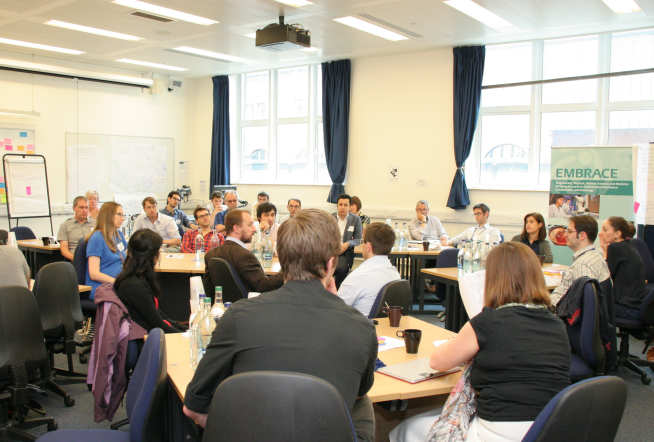
On 7 -8 July 2016, over 30 investigators from Imperial College and Universities of Newcastle, Surrey and Warwick gathered at South Kensington Campus to participate at the first EPSRC-supported EMBRACE Sandpit to propose innovative solutions to address the antimicrobial resistance (AMR) challenge.
The event was conducted by Knowinnovation, a company with more than 10 years of experience of running sandpit events. The four EMBRACE co-PI’s, Professors Chris Toumazou (Engineering), Alison Holmes (Medicine), Alan Armstrong (Natural Science) and Pantelis Georgiou (Engineering) were responsible for stimulating and provoking the participants with short talks and sharp questions. The three EMBRACE fellows, Doctors Lindsay Evans (Natural Science) and Pau Herrero (Engineering), were among the participants.
During the first day, several activities involving a lot of creative methods and soapbox talks were conducted in order to get to know each other and get a better picture of the expertise in the room. Lewis Preece from EPSRC gave a talk on the longer term funding opportunities that are on offer, and which could be used to obtain follow-up funding after the sandpit. The day ended with a dinner at 58 Prince's Gate.
The second day of the sandpit was focused on creating multidisciplinary teams of 4-8 participants and writing short, innovative proposals tackling the problem of AMR. At the end of the day, 5 proposals were presented which were evaluated by a panel of experts formed by Professors Alison Holmes, Alan Armstrong, Pantelis Georgiou and Ramesh Wigneshweraraj.
The winning team, led by Dr Andrew Edwards (MRC Centre for Molecular Bacteriology and Infection), was awarded £15K to develop an innovative solution to provide a novel target for a new type of therapeutic that promotes the killing of bacteria by the immune system.
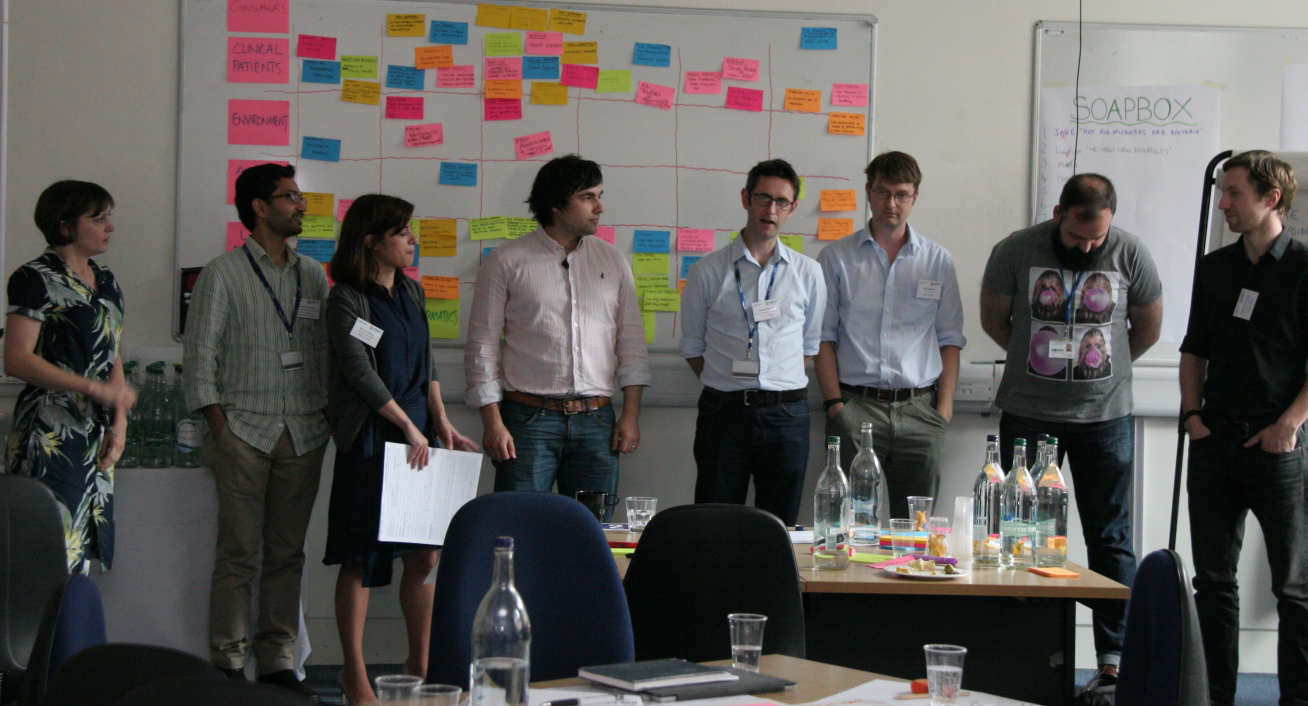
The two days of intensive work and networking brought out great ideas from the participants, some of which will be put forward to the recently announced EMBRACE pump-priming call. The success of the event was enjoyed by everyone present.
EMBRACE @ The Imperial Festival (7-8 May 2016)
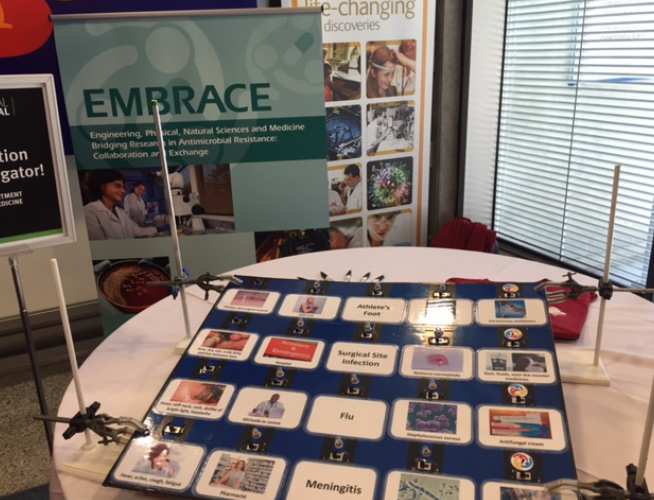
"Infection Investigator" game to show multidisciplinary approach to tackling AMR
This weekend saw the 5th annual Imperial festival welcome thousands of visitors. As the sun poured down, visitors to the South Kensington campus were invited to participate in talks, tours and interactive exhibits.
In the Superbug Zone the EMBRACE team and postgraduate researcher Rachel Troughton ran “Infection Investigator”., an interactive game that took participants on a journey from spotting infection symptoms, to where to seek appropriate healthcare, to the name of the disease, the pathogen responsible and finally what the appropriate treatment for that particular infection was.
Identifying the correct combinations completed electrical circuits to power light bulbs or motors, providing visual real-time feedback on their decisions. The game focused on three different pathogens responsible for many common infections (viruses, bacteria and fungi); fun facts and information on the differences between these microorganisms were also provided.
The game was designed to represent how the three Faculties (Medicine, Engineering and Natural Sciences) involved in the EMBRACE program can combine to tackle problems associated with Antimicrobial Resistance (AMR). Participants had to apply biological information to solve medical questions using engineering solutions, represented by the electrical components to the game.
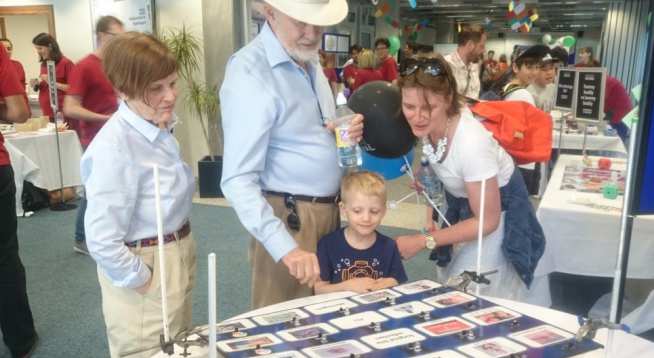
The game was designed to be played as a team and proved to be extremely popular, especially for families, with around 200 participants over the weekend. The aim of the game was to increase awareness of the different types of infection and what treatments are appropriate for each. Important points of discussion included recognising that flu is caused by a virus and as a result is not susceptible to antibiotic treatment. It is a common misconception that antibiotics can be used to treat viral infections such as colds and flu, and reducing this unnecessary use of antibiotics is an important step in tackling the emergence of antibiotic resistance.
We would like to say a big thank you to Rachel Troughton, Pau Herrero-Vinas and Lindsay Evans for their hard work in developing the exhibit and also to our amazing volunteers Claudia Adele, Michiyo Iwami and Bernard Hernandez Perez for their time over the weekend and their enthusiastic engagement with the public.
Our Research Network
- Behavioural and Social Science
- Diagnostics and Innovation
- Environment and the Microbiome
- Intelligent Use of Data
- Management and Prevention
- Molecular Biology
- Pharmacology and Therapeutics
- Public Health and Policy
- Structural Biology

This theme is focussed on improving our understanding of the behaviours in both primary and hospital care settings which can drive antibiotic resistance. Changes in behaviour that can avert threats associated with inadequate antimicrobial stewardship are being researched, communicated and implemented in the Imperial Healthcare NHS Trust and beyond. These behavioural interventions will include short, medium and long-term strategies to improve the quality of antimicrobial prescribing which will have practical application for the benefit of patients resulting from improved health care.
 This theme encompasses research into how antimicrobial resistant infections can be diagnosed in laboratories and at the point of care and how clinicians can be supported to make optimal choices about treatment for patients. Specific areas of expertise include the development of mobile applications which give clinicians access to patient data at the bedside, the use of artificial intelligence to assist in appropriate decision making around antibiotic therapies, to modelling approaches evaluating the effects of novel antibiotic drugs.
This theme encompasses research into how antimicrobial resistant infections can be diagnosed in laboratories and at the point of care and how clinicians can be supported to make optimal choices about treatment for patients. Specific areas of expertise include the development of mobile applications which give clinicians access to patient data at the bedside, the use of artificial intelligence to assist in appropriate decision making around antibiotic therapies, to modelling approaches evaluating the effects of novel antibiotic drugs.
 Researchers within this theme are investigating how interactions between bacteria in the microbiome affect antimicrobial resistance. This includes understanding the effect of ecological interactions between bacterial species on the evolution of antibiotic resistance, and investigating the transfer of antibiotic resistance between bacterial strains or species via plasmids. Research will extend to include the build-up of resistance in the environment, and contamination and residues left in animals will also form part of this theme.
Researchers within this theme are investigating how interactions between bacteria in the microbiome affect antimicrobial resistance. This includes understanding the effect of ecological interactions between bacterial species on the evolution of antibiotic resistance, and investigating the transfer of antibiotic resistance between bacterial strains or species via plasmids. Research will extend to include the build-up of resistance in the environment, and contamination and residues left in animals will also form part of this theme.
 This theme uses epidemiology, surveillance, bioinformatics and mathematical modelling to inform the fight against Antimicrobial Resistance (AMR). Specific research includes the use of modelling methodologies to understand the emergence and spread of AMR at the population level and how the introduction of vaccination may affect the prevalence of AMR, and also, the use of highly specialised techniques such as mass spectrometry to identify bacteria at the strain level.
This theme uses epidemiology, surveillance, bioinformatics and mathematical modelling to inform the fight against Antimicrobial Resistance (AMR). Specific research includes the use of modelling methodologies to understand the emergence and spread of AMR at the population level and how the introduction of vaccination may affect the prevalence of AMR, and also, the use of highly specialised techniques such as mass spectrometry to identify bacteria at the strain level.
 Researchers within this theme are working to improve the management of infections, the emergence of resistance, current treatment regimens and strategies for preventing the spread of infection at a local and global level. We are furthering our understanding of the extent of antimicrobial resistance, developing diagnostics to monitor treatment strategies, and developing and assessing the efficacy and safety of novel treatments.
Researchers within this theme are working to improve the management of infections, the emergence of resistance, current treatment regimens and strategies for preventing the spread of infection at a local and global level. We are furthering our understanding of the extent of antimicrobial resistance, developing diagnostics to monitor treatment strategies, and developing and assessing the efficacy and safety of novel treatments.
 This theme encompasses research into the molecular mechanisms which underlie bacterial pathogenesis. This includes examining the molecular changes that make bacteria antibiotic-resistant, understanding bacterial cellular processes in order to identify new target proteins for antibiotics, understanding how the interactions between bacteria and their host affect the success of antibiotic treatment, and investigating how antibiotic resistance mechanisms can be identified in the laboratory.
This theme encompasses research into the molecular mechanisms which underlie bacterial pathogenesis. This includes examining the molecular changes that make bacteria antibiotic-resistant, understanding bacterial cellular processes in order to identify new target proteins for antibiotics, understanding how the interactions between bacteria and their host affect the success of antibiotic treatment, and investigating how antibiotic resistance mechanisms can be identified in the laboratory.
 Research within this theme will produce novel antimicrobial therapeutics which will replace treatments to which resistance is widespread in clinical practice. This theme brings together expertise in antimicrobial synthesis and drug design towards novel targets, target validation, the efficacy of target protein inhibition, and analysis of the effects on bacterial cells. Our researchers are devising parallel synthesis of compounds to provide hit structures for bioassay and optimisation of structure-activity relationships to provide lead compounds for further in vivo studies. These lead compounds will eventually progress into phase-I clinical trials.
Research within this theme will produce novel antimicrobial therapeutics which will replace treatments to which resistance is widespread in clinical practice. This theme brings together expertise in antimicrobial synthesis and drug design towards novel targets, target validation, the efficacy of target protein inhibition, and analysis of the effects on bacterial cells. Our researchers are devising parallel synthesis of compounds to provide hit structures for bioassay and optimisation of structure-activity relationships to provide lead compounds for further in vivo studies. These lead compounds will eventually progress into phase-I clinical trials.
 The Public Health and Policy research theme is focused around maintaining a healthy public, protecting them from threats to their wellbeing. Incorporated into this theme are the interdisciplinary approaches of epidemiology, biostatistics and health service policy research. Programmes of research include investigating minimising the risk and impact of illness, encouraging the use of new technologies to greater clinical effect and the uptake of more effective treatments for patients.
The Public Health and Policy research theme is focused around maintaining a healthy public, protecting them from threats to their wellbeing. Incorporated into this theme are the interdisciplinary approaches of epidemiology, biostatistics and health service policy research. Programmes of research include investigating minimising the risk and impact of illness, encouraging the use of new technologies to greater clinical effect and the uptake of more effective treatments for patients.
 Researchers in this theme are furthering our understanding of the molecular structures of microbial macromolecules and how these affect antimicrobial resistance (AMR). It includes the development of biosensors to determine which micro-organism is infecting a patient, investigating how bacteria sense the presence of antibiotics, examining which molecules are involved in AMR, identifying enzymes that could be new targets for antibiotics and using living cells to manufacture antimicrobial compounds.
Researchers in this theme are furthering our understanding of the molecular structures of microbial macromolecules and how these affect antimicrobial resistance (AMR). It includes the development of biosensors to determine which micro-organism is infecting a patient, investigating how bacteria sense the presence of antibiotics, examining which molecules are involved in AMR, identifying enzymes that could be new targets for antibiotics and using living cells to manufacture antimicrobial compounds.



/dev01/channel_2/media/migration/research-groups/Pantelis--tojpeg_1494233293667_x4.jpg)